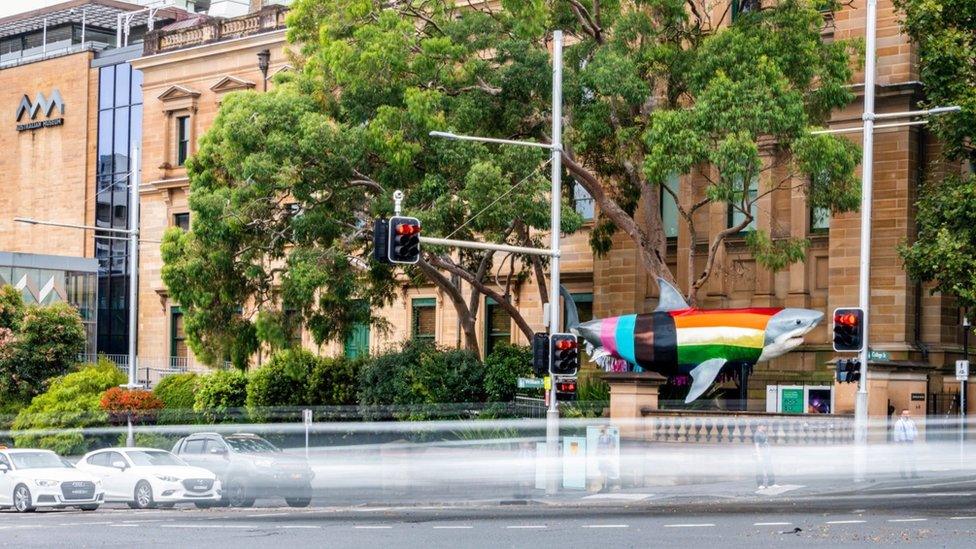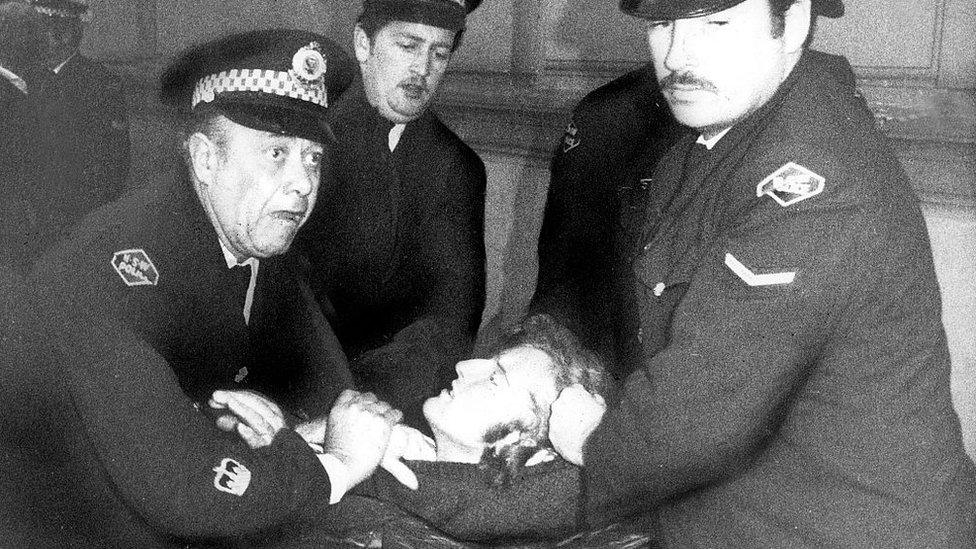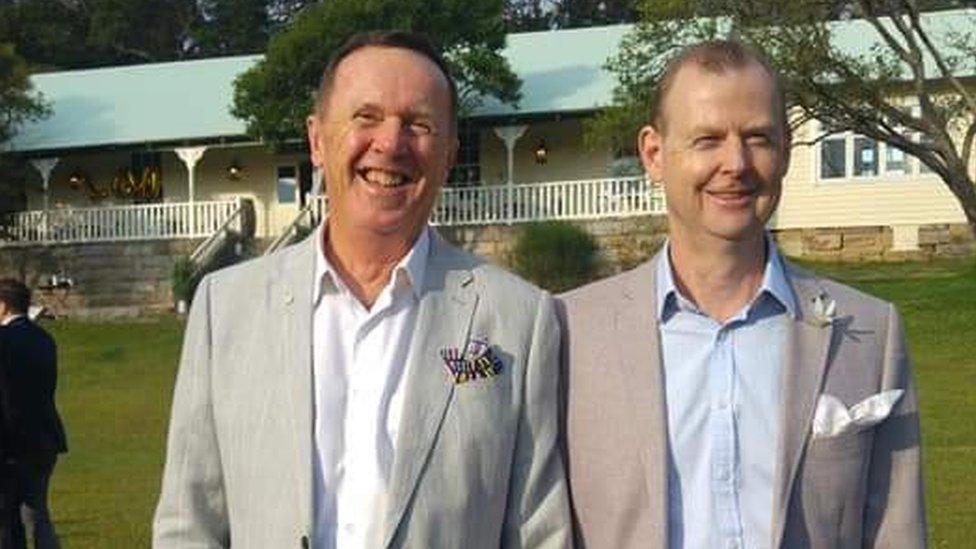How Progress Shark became Australia's accidental World Pride icon
- Published

Progress Shark sits on one of Sydney's busiest intersections
What if we put a giant model shark in a sparkly rainbow swimsuit?
Like many great ideas, the pitch for Progress Shark - a recent Australian viral sensation - was equal parts "ridiculous" and "brilliant".
The Australian Museum wanted to create a vivid and unique sign to welcome hundreds of thousands of visitors to Sydney as the city hosts the month-long World Pride festival from Friday.
And - somewhat serendipitously - they already had a 10m great white, or white shark, displayed in front of the museum, on one of the city's busiest intersections.
"We went: 'Right, well how about we just cover it in a rainbow?'" says Amanda Farrar, head of the museum's pride committee.
The result, its creators say, is a queer celebration - a bold, colourful, and tasselled homage to lycra.
And it's inherently Australian - funny, irreverent and, stereotypically, dressed for the beach.
"It has become the accidental icon of World Pride," Ms Farrar tells the BBC.
Progress Shark has captured international attention, sparked countless memes and won adoring fans including Australian drag queen Courtney Act. It even has its own Instagram fan account, external.
Artist George Buchanan - who brought the museum's vision to life - had no inkling Progress Shark would be such a hit when she was crafting its outfit in her Sydney garage.
"It's a ridiculous choice," she tells the BBC.
"But that's actually what is making people happy… I think people need a bit of silliness in their lives."
"It's this supposedly menacing creature, but you look at its face and it's very, very cute now. It's got this really cheeky grin."
The shark's couture ensemble is 11 materials in various colours and textures fashioned into two symmetrical "progress flags" - an updated form of the Pride flag created in 2018.
And while designing swimmers for a shark is one thing, dressing it was the real challenge.
Ms Buchanan and a helper had to literally sew the swimsuit on to the shark, which is suspended five metres in the air.
"We thought it would take about four hours but it ended up taking about six or seven."
Progress Shark is part of a bigger public art project marking the arrival of World Pride in Sydney.
The sails of the iconic Opera House will be lit up with the progress flag, Bondi Beach's famous sea wall will be covered with Pride murals and some of the city's most famous streets have been painted in rainbow colours.
It is a wildly different reception to that of the infamous first Mardi Gras march that wound its way through Sydney in 1978.
When protesters peacefully marched beyond the point they had a permit to, police responded swiftly and heavily.

A file photo from the Sydney Morning Herald showing police arrest protesters in 1978
"I remember garbage tins being thrown through the air and people being dragged by the hair and arms into police vans and things like that," Frank Howarth, who was a student at the time, tells the BBC.
Others who attended recall hearing those who were arrested cry out in pain from their police cells as they were bashed.
Homosexuality was still illegal in many Australian states, including New South Wales, and an undercurrent of fear was a normal part of life.
"I knew that there were places you didn't go because you might get bashed by thugs, or worse than that, trapped by police," Mr Howarth said.
"If any gay people were arrested, they would publish their names and addresses and professions in the newspaper and things like that."
"And there were the beginnings of the rumours going around about gay hate murders."
In 2016, New South Wales Police formally apologised to those who marched in the first Mardi Gras - who are known as 78ers - and officers now proudly join in the parade.
That's one tell-tale sign of how things have progressed in Australia in the years since that first march, Mr Howarth says.
"The change has been both subtle and dramatic."
Homosexuality is now legal, so is gay marriage, and discrimination based on a person's sexual orientation or gender is now against the law - with religious exemptions.

Frank Howarth pictured with his husband Peter at a wedding
"On the legal rights front, there's very, very few remaining anomalies," Mr Howarth says.
And for the first time ever a sitting prime minister - Anthony Albanese - will join the Mardi Gras parade on 25 February.
But the celebrations also come as debate over the practice of gay conversion therapy - which remains legal in New South Wales - gains heat.
So while Mardi Gras in Australia has moved from primarily protest to primarily celebration, Mr Howarth argues activism must remain a key part of the occasion.
"Those rights were hard fought but could be easily taken away."
"And we've got to the point [of accepting] that not everybody is straight, but there's a long way to go in the discussions around gender fluidity."
But Mr Howarth, who coincidentally is a former director of the Australian Museum, says watching Sydney dress itself up for World Pride is heart-warming.
"We look back on what it was like in 1978 and it's just a huge difference."
Attractions like Progress Shark are a bit of fun, he says, but are also moving symbols of growing acceptance.
"There are jokes about not coming out of the closet but smashing the door down and I think the rainbow shark is a bit of a symbol of that."
"With Anthony Albanese being part of the parade, with all the decorations around the city… it makes me smile."